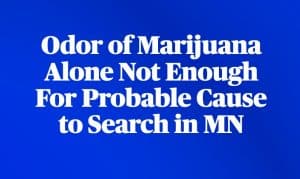Odor of Marijuana Alone is Not Enough to Search Says MN Supreme Court
Recently, the Minnesota Supreme Court determined that only the odor of marijuana is not sufficient for probable cause to search a vehicle in State v. Torgerson. Significantly, this decision is based on Minnesota law in 2021, which is beforemarijuana was legalized this year across the state. Thus, the court’s decision did not hinge on the fact that marijuana is legal in Minnesota now.
A favorite reason for law enforcement to search a vehicle is based on the odor of marijuana. First, how are you going to challenge a person’s sense of smell? All the body-camera and squad video footage is not going to catch that. Cop can just say “I smell marijuana” and ask to search your car. No more, says the Minnesota Supreme Court. Cops are going to need more than just the smell of marijuana.
In Torgerson, the court went to great lengths to explain that the true test for probable cause to search is based on the totality of the circumstances. See plural form of circumstance. Find something more, police. Your K-9 senses are not enough. Often, the totality of the circumstances will include a person’s driving conduct, admissions to smoking marijuana, seeing marijuana in the vehicle, movements indicating impairment or possession, etc.
To further its point, the court relied on State v. Burbach. In that case, the court determined that the odor of alcohol coming from an adult passenger did not provide reasonable suspicion of an open-container violation to allow expanding a traffic stop. Even though Torgerson involves a challenge to probable cause to search a vehicle, Burbach is still applicable because the officer could not point to any other factors of impairment or contraband besides the smell of an alcoholic beverage coming from the passenger and the driver’s nervousness.
It is important to note that Torgerson did not challenge the basis for the expansion of the traffic stop at the district court level. Nor, did the prosecution argue that the good faith exception applies at the district court level. Two things the supreme court paid credence to in footnotes but failed to address the arguments because they were not properly raised at the district court.
The dissent in Torgerson highlights that probable cause is not a high standard. A favorite reasoning for many judges and high court justices across Minnesota. When they just want to say the officer’s conduct is okay, just mention it does not take much for probable cause. The dissent follows that up with let’s use that “common-sense standard here”. Fortunately, the majority of Minnesota Supreme Court Justices did not agree. Score one for the underdogs; and pay attention to expansions of seizures and searches involving only the odor of marijuana.
Robert H. Ambrose is a criminal defense attorney and DWI lawyer in Minnesota. Super Lawyers named him Super Lawyer the past two years and a Rising Star the previous six years. He is an adjunct professor at the University of Minnesota Law School for the past six years. DWI Attorney Woodbury MN, Criminal Defense Lawyer Minneapolis MN, Drug Crimes Lawyer Minnesota.

